Vaccination of akds for adults, consequences and contraindications. What is aks vaccine? Advantages of an imported vaccine
Good afternoon, dear parents! Have you given your child a DPT vaccine? Judging by her experience, and by the numerous publications and reviews on the network, it is she who instills fear in everyone and everything. And it is not unreasonable. Doctors do not deny that DPT has a high percentage of complications, a number of contraindications and side effects and requires serious preparation before its introduction.
But at the same time, they insist that it protects against the most dangerous infectious diseases. So, to be or not to be? It is with this that we will help you figure it out.
The DPT vaccine is used to prevent diseases such as diphtheria, tetanus, and whooping cough.
Its decoding is simple: adsorbed diphtheria-tetanus-pertussis vaccine. The drug is considered combined due to the fact that it has antigens of three most dangerous diseases at once. By the way, do not be intimidated by this figure.
The fact is that the number of vaccine components does not matter for our body, but rather their compatibility. Therefore, in in this case there is no need to talk about any unnecessary burden on the immune system.
2. Types of DPT
On modern market there is a DTP vaccine of a domestic manufacturer and a foreign one. The latter is most often meant Infanrix(United Kingdom). They differ from each other not only in their cost, but also in influence - the imported vaccine is more easily tolerated by the body.
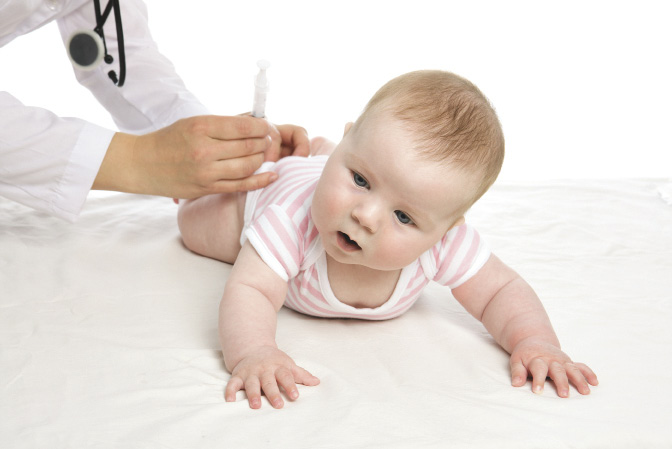
Besides, all DPT vaccinations are divided into:
- whole cell(DTP proper) - they cause more side effects, since they include killed cells of pathogens;
- acellular, or clerical (AaKDS) - the aforementioned Infanrix. The drug consists of small particles of pertussis microorganisms and tetanus and diphtheria toxoids, due to which it causes less negative consequences and complications. Simply because it is free of allergens.
Along with this, there are other variants of DPT, enriched with components that contribute to the formation of immunity to other diseases, namely:
- Pentaxim- French vaccine. What does it protect from? For diphtheria, tetanus, whooping cough, haemophilus influenzae and poliomyelitis;
- Tetracock- vaccine against tetanus, diphtheria, pertussis and poliomyelitis;
- Bubo-M- from tetanus, diphtheria and hepatitis B;
- Tritanrix-NV- in addition to tetanus, whooping cough and diphtheria, it also protects against hepatitis B.
According to doctors, complications after DPT vaccination arise precisely because of the pertussis component.
At one time, some countries even abandoned it, releasing drugs that form immunity only to tetanus and diphtheria. But later they returned to him anyway, as outbreaks of whooping cough resumed on their territory.
In our country subject to intolerance to the pertussis component or the occurrence of excessively violent reactions to it, may be used following vaccines:
- ADS- from tetanus and diphtheria;
- ADS-m- acts similarly to the first, but is intended for revaccination;
- AS- against tetanus;
- AD-m- against diphtheria.
3. Scheme of grafting
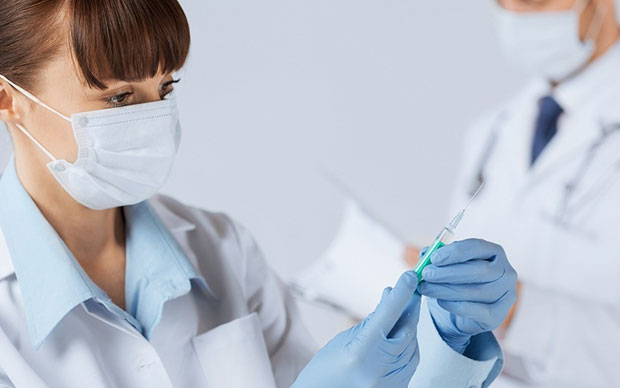
According to the vaccination schedule, DTP is done in several stages:
- the first falls at the age of 2-4 months. During this period, the child is administered 3 doses with an interval of 30-45 days;
- the second - for 15-18 months;
- the third - 4-6 years old;
- the fourth - 14 years old;
- the following vaccinations are given every 10 years.
But this is the ideal. In fact, it often happens that the vaccination scheme is disrupted due to the child's illness. Do I need to start all over again in this case? No. It is enough to simply continue the vaccination by making a new injection as soon as possible.
4. Where do you get the DTP vaccine?
The DPT vaccine is administered intramuscularly. Traditionally, the injection site is the child's thigh. And there are at least 2 reasons for this:
- Firstly, in this area, even babies have well-developed muscles.
- Secondly, blood vessels do not pass in this area and sciatic nerve... There is also no large fat layer in it, once in which the drug will simply be useless.
And finally, according to international studies, the vaccine injected into the thigh promotes the maximum production of antibodies by the body.
5. Reactions to DPT: mild and severe
Many mothers complain that after the DPT vaccination, the baby's temperature rises, behavior changes, a rash is observed, and so on. I will not exaggerate if I say that each of them in itself is a reason for panic, especially for a young mother. However, doctors insist that this is a normal reaction of the body, and you should not be afraid of it.

At the same time, they conditionally divide such reactions into mild, moderate and severe.
The following are considered light:
- the appearance of temperature;
- irritability;
- deterioration in appetite;
- vomit;
- lethargy;
- swelling, redness, or pain at the injection site.
To reactions of moderate severity relate:
- continuous crying (for 3 hours or more);
- high body temperature (above 40 degrees);
- convulsions.
Severe consequences of vaccinations are:
- serious allergic reactions;
- persistent convulsions, loss of consciousness, coma;
- brain damage.
Reviews of moms on the forums indicate that temperature after DPT may last for several days. It is necessary to knock it down already at around 37.5 antipyretic. Some pediatricians advise giving it immediately upon arrival home, without waiting for a promotion. And if, nevertheless, having increased, after some time it does not fall, consult a doctor.
Another unpleasant consequence is compaction after vaccination that occurs at the injection site. It can cause pain, which can be reduced by a cool, sterile dressing. Nevertheless, it is better to apply it after consulting a pediatrician. Perhaps he will advise more effective ways exactly in your case. As a rule, such a bump completely disappears in 2-3 weeks.
6. Preparation for DPT
If possible, it is better to show the child not only to the pediatrician, but also to the neurologist before administering the drug.
Also, it is desirable pass clinical analysis blood and urine... They will confirm the presence or absence of viruses and bacteria in the child's body, even if outwardly there are no symptoms. For example, when their concentration is insignificant and the body is successfully fighting them. For now, anyway.
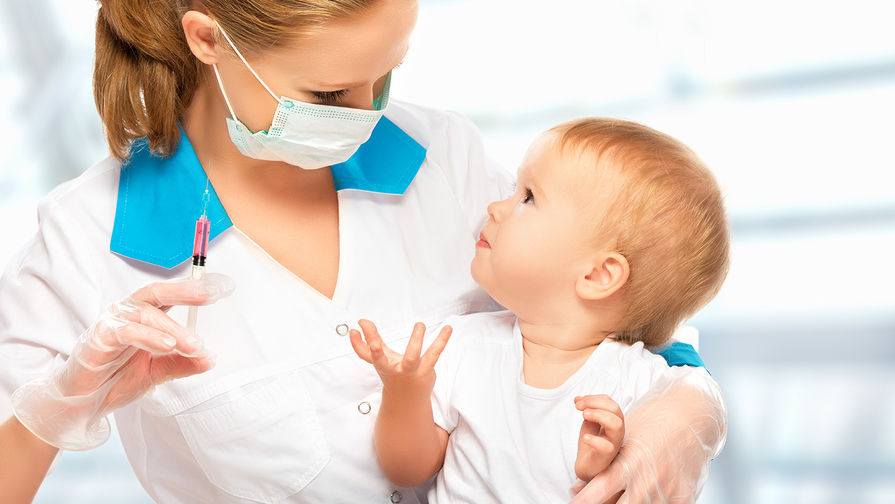
These precautions will make sure that the child is absolutely healthy and can more easily tolerate vaccination with DTP, either imported or domestic.
7. When you can not get the DTP vaccine
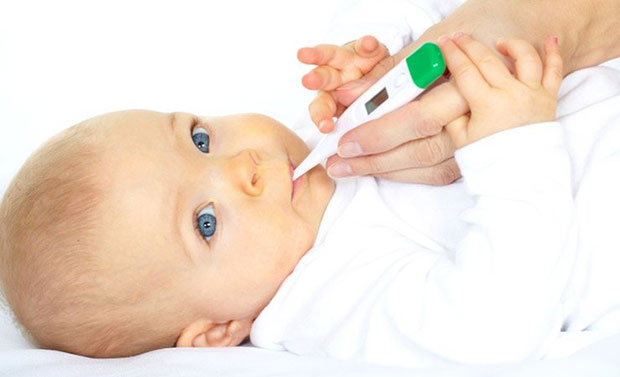
DTP vaccination is contraindicated in the following cases:
- in the presence of acute illness in any form. We are talking about pneumonia, bronchitis, pyelonephritis and other diseases, which are accompanied by a temperature above 38 degrees;
- in the presence of a pronounced allergic reaction to a previously given DPT vaccination - convulsions, continuous crying, fainting, etc.;
- when disorders and diseases appear nervous system that appeared within 7 days after the previous DPT vaccination;
- in the presence of diseases of the kidneys, liver and heart;
- in the presence of any progressive diseases, including epilepsy, encephalopathy, febrile seizures, etc.
More detailed information about the DPT vaccination can be obtained in the video at an appointment with Dr. Komarovsky:
8. Reviews of the DPT vaccine

Helena:
We gave the child Tetrakok, because, according to the pediatrician, this vaccine is cleaner and better than the domestic one. I can't say that everything went smoothly. There was a fever, the baby refused to eat, play, but, thank God, all the consequences for us ended there.
Kate:
The doctor advised us Infanrix. There were no side effects, TTT. Even the temperature didn't rise. Moreover, I did not give any suprastins and other things. True, I decided on the first vaccination when my daughter was over a year old.
Olga:
They put domestic DPT, for 3 days the temperature did not fall below 39, the baby cried all the time.
Nikita:
The child had a fever and a bump on his leg during the domestic one. He then limped for a week.
From year to year we are convinced that vaccination is the only way to protect children from terrible ailments. No one argues with this, but many do not know to which dire consequences she can lead.
That is why the choice, as well as the responsibility for it, always falls on the shoulders of the parents. Remember this while doing it.
And be sure to share this information with others, give everyone a chance at happy childhood and motherhood!
And also subscribe to our updates and come back to us again! See you soon!
All people, both adults and children, should be vaccinated in a timely manner. Vaccinating babies is most important medical procedure... Many parents are interested in: “What is DTP? And what kind of DPT vaccine is given to children? " This vaccine is aimed at combating whooping cough, diphtheria and tetanus, which determines the corresponding decoding of the DPT vaccine. These diseases are in the top of the most dangerous diseases. Often, complications contribute to the onset of developmental disorders, as a result of disability.
DTP transcript and used vaccines
DPT is the most common type of vaccination worldwide. Decoding DTP: Adsorbed Pertussis Diphtheria Tetanus vaccine. In the international nomenclature, it is designated DTP. Having learned the meaning of the abbreviation, some parents still ask: "DTP drugs for what?" The answer is simple: vaccination has a combined effect on diseases of the same name.
The domestic vaccine is represented by Infanrix.
From what vaccinations with a DTP component can still be? Possible drugs that also act in addition to other diseases, for example:
- + Poliomyelitis: Tetracoccus.
- + Poliomyelitis and hemophilic infection: Pentaxim.
- + Hepatitis B: Tritanrix.
This vaccination is the basis for immunization. But with all the positive, sometimes the component that is responsible for whooping cough causes a significant bad influence... Therefore, only tetanus and diphtheria are often vaccinated together. Such an ADS vaccination has a decoding similar to the DPT vaccination, excluding the Pertussis component.
In Russia, such vaccines are presented:
- Domestic ADS or foreign D.T. Wax: for children under 6 years old.
- ADS-m and foreign D.T. Adulte: for children aged 6 and over.
Vaccines for certain types of diseases:
- AS: tetanus.
- HELL: anti-diphtheria.
Vaccination location
 DTP vaccination is administered intramuscularly. With the help of this technique, the optimal rate of distribution of the constituents of the drug is achieved for the formation of immunity.
DTP vaccination is administered intramuscularly. With the help of this technique, the optimal rate of distribution of the constituents of the drug is achieved for the formation of immunity.
A child is most often given DPT in the thigh area, where muscle tissue is well developed. An adult is repositioned on the shoulder. This can be done if only the muscles there are sufficiently developed.
Injection under the skin is unacceptable, vaccination will be considered useless. The introduction to the gluteal region is excluded. This is due to the presence of a large body fat, as well as the risk of falling into a blood loan or the sciatic nerve.
Contraindications
You should carefully consider the factors in which this vaccination is impossible.
General contraindications:
- all diseases in the acute period;
- signs of immunodeficiency;
- allergic reactions to the components in the composition of the drug.
In this case, the vaccine is transferred until complete recovery, or not at all.
Provisional not admission is received by: 
- children with leukemia;
- pregnant women;
- children in the period of exacerbation of diathesis.
With convulsions and neuralgia associated with elevated temperature perhaps the introduction of ADS instead of DPT.
V mandatory those who have false contraindications should receive admission:
- allergies in relatives;
- early birth date;
- convulsive conditions in relatives;
- perinatal encephalopathy;
- observation of severe exacerbations in relatives with the introduction of DPT.
People with such signs, having received admission from the attending physician, may well be vaccinated.
Should children be given DPT?
Nowadays, many parents take a sharply negative position in relation to vaccination. Of course, you can understand their point of view. After reading articles on Wikipedia, Google and other resources, they, without understanding correct meaning terms, believe that in this way is done even more harm than the benefits of vaccination.
I would like to dispel this myth. It has been scientifically proven that when DTP is administered, it is possible to avoid serious complications from diseases, and even lethal outcome... That is why the DPT vaccine is given to many babies all over the world.
The human body, even very small, is able to cope with the components of drugs that are this moment are perfectly designed in composition. Thanks to many years of experience, a formula has been developed that allows you to carry out the procedure for preventing diseases with the least health risk.
The number of DTP vaccinations and the scheme of affixing
In small childhood DTP vaccine is supplied in four stages: 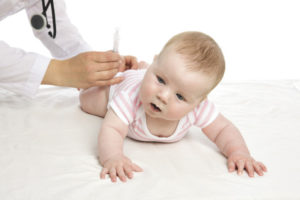
- At 3 months.
- At 4-5 months, after 30-45 days.
- At 6 months old.
- At 1.5 years old.
V this period they are vaccinated with DTP for the best addition of immunity and the acquisition of antibodies to diseases of the same name. At a later age, vaccines are affixed at 6-7 years old, and later, at adolescence 14 years old. This is only aimed at maintaining the number of indicators already acquired. This procedure is called DPT revaccination.
Arming interval
The interval between vaccines is strictly determined by medical institutions. So the first 3 stages are carried out at intervals of 30-45 days. Further medications introduced after at least 4 weeks.
There is a possibility to postpone vaccination: due to illness, or for other reasons of refusal. If possible, admission to vaccination should be affixed immediately.
If vaccination is delayed, re-vaccination should not be started. The chain of stages continues. That is, in the presence of the first vaccination, the next two should be with an interval of 30-45 days between them, the next one comes in a year. Next comes the schedule.
How many times they give DTP for adults
 The last stage of childhood ends at the age of 14. Subsequently, adults should undergo revaccination every subsequent 10 years. Therefore, at an older age, the DTP vaccine for adults is given at 24, 34, 44 years old, etc.
The last stage of childhood ends at the age of 14. Subsequently, adults should undergo revaccination every subsequent 10 years. Therefore, at an older age, the DTP vaccine for adults is given at 24, 34, 44 years old, etc.
In most cases, adults are prescribed ADS, since this type excludes the component of whooping cough, which is of little danger for older people.
If you do not undergo revaccination, then the number of antibodies that can fight the disease decreases, and there is a risk of infection. But the disease in this case will pass in the mildest form.
First DPT
The initial DTP should be at the age of 3 months. Maternal antibodies persist only 60 days after the baby is born. To restore antibodies, doctors have appointed just such a period for the first setting of the drug.
If the first DPT is postponed medical indications, then it is allowed to do it up to the age of 4 years. Sometimes it seems impossible, then vaccination should take place after 4 years and only with drugs against ADS.
To avoid complications after the DPT vaccination, the baby is brought healthy for the procedure. When observing an increase in the thymus gland, it is not recommended to place DTP, since there is a high risk of severe reactions of the baby.
DTP vaccination is carried out with any drug existing for these purposes. Infanrix is most easily tolerated, and under the influence of the rest, post-vaccination reactions can be observed. They are not complications, and the baby's body is able to cope with them.
Second DPT
 Under favorable conditions for vaccination, the second stage is carried out after 30-45 days after the DTP vaccination of the first stage, therefore, at 4.5 years.
Under favorable conditions for vaccination, the second stage is carried out after 30-45 days after the DTP vaccination of the first stage, therefore, at 4.5 years.
It is recommended to plant the toddler the same drug as the original DTP. But in the absence of such a medicine, you should not despair, because according to the WHO conclusion, all types of DTP vaccinations and vaccines can be replaced with each other.
Many parents are at times intimidated by the reaction to a booster shot. Yes, it can be stronger than the first DPT. This phenomenon occurs due to the fact that during the initial vaccination a certain amount of antibodies is introduced, which, when faced with microbial components, for the second time begin their resistance and the body's defense reaction. The effect of a negative reaction to the second stage of vaccination is considered the most pronounced and severe of all subsequent ones.
With the introduction of the first vaccine, significant negative reaction, therefore, a different drug is selected for the second procedure. Usually, ADS is used instead of DTP, since active ingredient responsible for whooping cough and causes such reactions.
Third DPT
Vaccination number three occurs 30-45 days after the second stage DPT vaccination. If, when transferring the vaccination, later DPT was delivered, then it is still considered the third.
Even at the third stage of inoculation, a strong reaction from the body is possible, which should not be scary caring parents... In the absence of the same drug as in the previous steps, the planned procedure should not be postponed. Another, no less good quality medicine is chosen.
Preparation before vaccination
DTP vaccination is recognized as the most reactogenic procedure. To alleviate and eliminate adverse reactions, you should carefully prepare for the event. 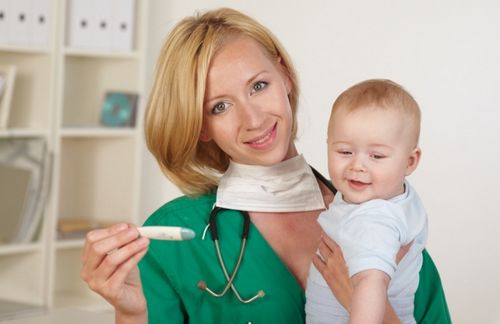
General rules:
- A person must be completely healthy.
- The procedure is performed on an empty stomach. Make sure that the child wants to eat before the procedure.
- If the procedure is performed for a baby, you need him to poop before DPT.
- The child is dressed so that he does not have a fever.
The drug should be administered while taking painkillers, antipyretic and antiallergic drugs. This is especially true for the vaccination of children.
Under observation severe pain the child is prescribed analgesics. To minimize adverse reactions, all these types of drugs should be kept close so that at the first symptoms there is an opportunity to take the drugs.
Scheme of drug preparation for DPT:
- For a couple of days, antihistamines are taken for allergic reactions.
- On the day of the procedure, after it is carried out, antipyretic suppositories for children are introduced or pills are prescribed for adults. Observe the temperature level. Take anti-allergy pills.
- Second day: antihistamines are taken, with high temperature antipyretic.
- On the third day, improvement is usually observed and any medication is discontinued.
The best option is the selection of medications for the baby with a pediatrician before the DPT procedure.
Actions immediately after
For confidence in good condition, the child should spend the first half hour close to the hospital. You can either stay in the hospital itself or take a walk next to it. This is done taking into account the fact that a very severe allergy may occur, requiring specialized medical intervention and further monitoring within the hospital. 
If there are no allergic reactions, then you can go home. With a lot of activity, the baby should take a walk in nature, avoiding crowds of children.
Upon arrival at the house, the child should be given an antipyretic, not relying on the temperature at the moment. Strict temperature control must be maintained throughout the day. In order to take measures to normalize it when increasing.
Antipyretic suppositories are used before bedtime. Abundant feeding is excluded. Only ordinary food is allowed, not allergy-causing... The liquid should be given in large volumes, mainly water. Follow temperature regime in the room. The temperature should be within 22 ° C. If there is a favorable state of health of the baby, then pay attention to walks, but exclude communication with others.
Adverse reactions to DTP
As with many vaccination procedures, after DPT vaccination, both local and general side effects often appear. 
Local symptoms:
- pink spot, swelling, pain at the place of setting;
- violation of the movements of the vaccinated leg due to pain.
Common symptoms:
- high temperature;
- nervousness, whims, anxiety of the baby;
- long sleep;
- deterioration in appetite;
- vomiting and diarrhea.
If you develop side effects from DTP vaccination on the first day, do not worry. The reason for visiting the clinic should be considered the appearance of signs on the third or more day.
Complications requiring medical attention
DTP drugs, when done, can have serious consequences. These effects include:
- Severe allergic forms (Quincke's edema, anaphylactic shock, etc.).
- Convulsive phenomena at normal temperature.
- Encephalopathy.
If these symptoms appear, it is necessary to urgently call an ambulance or take the baby to the hospital.
When prescribing DPT vaccination for a child, his parents should not panic. Answer the question: "DTP, what is it?" a pediatrician will fully help. He will professionally explain how DPT stands. He will also consider the baby for admission to this procedure and prescribe medications after vaccination.
Video
Epidemiological data indicate incomplete coverage of children with preventive vaccinations in Russia. According to statistics, about 25% of children suffer frequent colds, allergies, which complicates the timely administration of the vaccine. Against the background of insufficient health, the drug should not be administered. Long bends are not rational. The fear of doctors of exacerbation of inflammatory diseases or colds is unfounded, since effective weakened drugs have been developed.
There are problems with the clinical examination of this contingent. Sensitization is not a contraindication as weakened DPT vaccines are available.
- Allergic rhinitis;
- Atopic dermatitis;
- Bronchial asthma.
The rationale for the introduction of conventional DTP vaccination for these nosological forms is low, since they have a recurrent course. With conventional prevention, stimuli are required - psychoemotional stress, influence chemical substances, viral and bacterial infections.
Children with chronic sensitization have an increased risk of complications from DPT.
Even weakened vaccines are administered to such children at the stage of remission. pathological process... In patients with frequent exacerbations, it is recommended to conduct a reaction against the background of antiallergic drug therapy... In patients with bronchial asthma specific vaccination is carried out with DTP-M between attacks of suffocation.
For mild asthma, antihistamines are prescribed 2 days before vaccination. The middle stage is characterized by inhalation of Intal a week before the procedure. Treatment continues for a month.
In people with severe bronchial asthma, diphtheria, tetanus, it is carried out simultaneously with anti-relapse treatment with theophyllines, intal, inhaled corticosteroids long acting- flixotide, budesonide, becotide, symbicort, seretide.
Preventive antihistamine therapy with bronchodilators is indicated for children with systemic allergies:
- Quincke's edema;
- Anaphylactic shock;
- Generalized urticaria.
In severe bronchial asthma, it is rational to administer ADS-M or ADS-toxoid in a hospital setting.
DTP vaccination: when done
DTP (according to the international nomenclature "DTP") - adsorbed diphtheria-pertussis-tetanus vaccine. The combined composition is produced by the manufacturer under the name Infanrix. Statistics show a small number of complications after being vaccinated against diphtheria, pertussis, tetanus. If desired, preventive vaccination in Russia can be carried out with combined formulations such as "Pentaxim-DPT - poliomyelitis". The basis of immunoprophylaxis is the study of the patient's state of health. The procedure cannot be carried out with a weakened immune system.
The presence of the pertussis component according to the international nomenclature contributes to the development of complications.
Types of vaccines in Russia:
- ADS-M - is administered to children after 6 years of age;
- Imovax;
- AD-M - against diphtheria.
Preventive vaccine therapy is a complex procedure that requires a thorough assessment of a person's health status.
DTP vaccination: when done
There is a vaccination schedule in Russia, national calendar determining when vaccinations are given:
- The first one is 2-3 months old;
- The second, the third - an interval in 1-2 months;
- The fourth - 1.5 years after the 1st vaccination.
When the first vaccination is given after 3 months, the pertussis component is injected at intervals of 1.5 months. Revaccination against diphtheria, tetanus is carried out at 7-14 years old, and then every 10 years.
The timing of domestic revaccination is somewhat different. The drug is administered to children under 4 years of age. No restrictions are imposed on foreign analogues.
Decoding DTP - adsorbed diphtheria-tetanus pertussis vaccine. The drug is known to many parents. Thanks to the tool, many lives have been saved. Patients ask pediatricians whether it is worth getting the DPT vaccine. Vaccine therapy is common in many countries. In practice shows high efficiency... The experiment dragged on for tens of years.
"Whether to be vaccinated with DPT" - the answer is obvious. You just need to see the parents who believed that the child did not need to get the vaccine. After contracting whooping cough, the child developed seizures. The use of antibiotics did not bring much relief. The deplorable consequences of a rash decision took another life. Of course, the parents regretted the wrong decision, but it was too late. Such a case occurred in the medical practice of the author of the article.
Experience shows that the DPT vaccine, for almost a century after its creation, has become effective remedy not only against diseases, the antigens of which are included in the vaccine. Statistics show that a vaccinated person goes to the clinic less because of the formation of specific immunity that can cope with dangerous infections.
Sad statistics led to the creation of the tool. Until the 50s of the last century, about five thousand children were sick with diphtheria. Of these, about half of the children died. About 85% of people who get sick die from tetanus. After analyzing these indicators, you need to assess whether it is worth getting the DPT vaccine. The Ministry of Health strongly recommends not to give up vaccine therapy, so it has been included in the national calendar. One injection is enough to protect immediately from 3 dangerous infections!
Adults are vaccinated with ADS, since whooping cough does not pose a health hazard. Revaccination is carried out to prevent a decrease in the number of active antibodies, the formation of which decreases over time.
If a vaccinated person falls ill without revaccination, the infection will be mild. Without prevention, a severe course will provoke death.
For the formation of a sufficient number of immunoglobulins, adherence to the calendar of preventive vaccinations is required. Immunity to tetanus, diphtheria, whooping cough is formed by specific vaccination.
DTP transcript of the national calendar:
- First - 3 months;
- The second - after 30-45 days;
- The third - 6 months;
- Fourth - 1.5 years
Above described other terms adopted European countries... In practice, pediatricians rarely manage to maintain optimal timing, so both options can be used.
If the deadlines are met, the child should receive 6 vaccinations. Revaccination - after 10 years.
DTP vaccines popular in Russia
Adsorbed tetanus liquid vaccine produced by NPO Microgen is produced in ampoules of 2 doses No. 10. The composition includes a suspension of killed bacteria whooping cough, diphtheria and tetanus toxoid. Merthiolate is used for conservation. The toxoids are adsorbed on aluminum hydroxide.
Vaccination according to the scheme:
- According to the national calendar - for the prevention of tetanus, whooping cough, diphtheria (3, 4.5, 6 months).
- Do not get vaccinated after the child is 4 years old;
- Injected intramuscularly into the upper outer quadrant of the gluteal muscle;
- Allowed to be used simultaneously with polio vaccination;
- Revaccination - 18 months;
- If the terms of the introduction of DPT by NPO Microgen are not observed, revaccination is carried out 12 months after the last injection;
- If the child is over 4 years old and he has not been vaccinated, it is rational to administer ADS-toxoid;
- After reaching 6 years without vaccination, immunization with ADS-M is carried out.
One vaccine contains about 30 international units of diphtheria toxoid, pertussis vaccine - at least 4 IU, tetanus toxoid - at least 60 IU. The liquid is slightly yellowish or white is transparent and contains a loose precipitate, which disappears upon shaking.
After administration, the body produces specific antibodies against whooping cough, diphtheria, tetanus, which should protect for 10 years (with full implementation dates of the national calendar).
Contraindications:
- History of seizures (febrile);
- Nervous diseases.
DPT NPO Microgen is administered according to a special scheme in children after 3 years of age.
If there are complications after the 3rd vaccination, the first revaccination is carried out after 12-18 months. Subsequent courses are done at 7, 14 years old in children. It is advisable for adults to be vaccinated every 10 years.
Infanrix for the prevention of whooping cough, tetanus, diphtheria
GlaxoSmithKline's purified liquid Infanrix contains 30 immunizing units of diphtheria toxoid, 40 MIE tetanus toxoid, 25 mcg pertussis toxin. Excipients - hemagglutinin, pertactin.
When preparing the agent, the toxoids of Clostridium tetani and Corynebacterium diphtheriae are inactivated and purified. The pertussis component is made by growing a culture of Bordetella pertussis with extraction, purification and isolation of PT, FHA.
The timing of the introduction is somewhat different from the national calendar and the previous DPT "Microgen":
- First injection at 3 months;
- The second - 2 years;
- The third is 6 years old.
Designed for deep intramuscular injection. It is carefully prescribed to persons with thrombocytopenia, a blood clotting disorder. At intramuscular injection there is a risk of bleeding, so after the procedure, you need to press the muscles tightly for about 2 minutes.
Infanrix should not be administered to people with hypersensitivity to any component of the drug. Do "Infanrix" children with encephalopathy of unknown etiology for a week, 7 days after the previous vaccination. The content of the pertussis component determines rare complications.
Infanrix is not done to children with encephalopathy without an established reason.
Side effects:
- Loss of appetite;
- Diarrhea;
- Vomit;
- Irritability;
- Fever;
- Swelling;
- Hyperemia;
- Pain.
The vaccine is used at the same time as other options for immunizing children. It is used in the same syringe together with vaccines for the prevention of Haemophilus influenzae type B. To preserve the properties, do not freeze the drug.
DPT: decoding the choice of timing, features of vaccination
Each subsequent dose is given no earlier than 4 weeks after the previous injection. If a child becomes ill during the next vaccination, you just need to treat the disease, and then vaccinate. The timing can be postponed for a long time, but the course can be prolonged immediately after the disease is cured.
When to get the first DPT vaccine
According to the national calendar, the first DPT vaccination must be given after the child reaches the age of 3 months. If during this time period the baby falls ill, vaccination is carried out after recovery.
Such periods are determined due to the loss of the immune activity of antibodies, which are transmitted to the baby along with the mother's milk.
If the first vaccination has not been carried out, then it can be done regardless of the child's age.
Severe complications after vaccination occur in children with an enlarged thymus. The first injection is best done with Infanrix, since fewer complications are observed on it. Domestic AKSD "Microgen" and imported - "Tetrakok" often cause reactions.
The second DPT is done 30-40 days after the primary immunization. All types of vaccinations against whooping cough, diphtheria, and tetanus are interchangeable. If it is impossible to use the drug that was vaccinated for the first time, you can use an analogue.
Usually, with the second administration, more pronounced reactions are traced, which is due to the presence in the body of antibodies against the injected antigens. Allergy with secondary vaccination is more the norm than a pathology.
In the presence of complications after the first DPT, the second injection at 4.5 months is done with drugs of weakened reactogenicity - ADS (diphtheria, tetanus components).
The third DPT is done 30-40 days after the second. If the previous immunization is missed, then the vaccination is performed and it is considered the 3rd (the second is skipped).
Choosing the site of DTP injection
Intramuscular administration of a vaccine preparation in children is considered predominant. World organization Healthcare (WHO) recommends that adults get the thigh immunization. Subcutaneous injection is not rational due to the long absorption of the substance into the bloodstream and low immunogenicity.
The child's thigh muscles are not developed, so it is impossible to give an injection. Schoolchildren have the opportunity to inject funds into the shoulder.
Complications after vaccination
To identify pathogenetic mechanisms a number of studies have been carried out on the reactions of the child's body to specific immunization. In patients with respiratory syndrome, bronchial asthma was not determined manifestations of violations of bronchial patency, theoretically, they should exist.
Exacerbations atopic dermatitis occur after injection of a vaccine preparation in children suffering from bronchial asthma, allergic conjunctivitis, pollen allergy.
In children with allergic diseases after vaccination with ADS-M and DTP-M in the post-vaccination period, there are weak reactions with a skin rash, moderately pronounced infiltrative changes.
The antibody titers formed after vaccination with ADS-M and DTP-M in children with an allergic reaction are no different from the immunoglobulins of healthy children.
Children with neurological disorders it is recommended to inject ADS-M-toxoid, which does not create a great burden on the immune system. The procedure is performed only when compensating for neurological syndromes, remission of allergic conditions. The assessment of the state of the brain is carried out on the basis of electroencephalography.
Immunization with DTP-M vaccine in neurological patients is rational to carry out only after detection of contact with a patient with whooping cough or diphtheria. In vaccine prevention centers, after a preliminary examination of the child by a neuropsychiatrist, the reactogenicity of the vaccine in relation to a specific patient is assessed.
Contraindications to DPT:
- Acute inflammatory infections;
- Allergy to the constituent components of the vaccine;
- Immunodeficiency states;
- Neurological symptoms;
- Elevated temperature.
Patients with perinatal encephalopathy, prematurity, allergic diseases in relatives, prevention is carried out with vaccine preparations of weakened reactogenicity (infanrix).
Dangers of Adsorbed Tetanus-Diphtheria Vaccine
DTP vaccination is one of the most immunogenic among the options included in the national calendar. Besides compliance general rules, drug preparation should be carried out.
General rules for vaccination:
- At the time of the procedure, the child must be healthy;
- You can't dress your baby warmly;
- Vaccination is done on an empty stomach;
- Before visiting treatment room it is advisable that the baby goes to the toilet.
Usually, the DPT vaccine is administered together with pain relievers, antipyretics, antiallergic drugs. Children's preparations based on ibuprofen, paracetamol effectively relieve inflammatory reactions. Rarely are accompanied by side effects.
Parents, before visiting a children's clinic to vaccinate a child, must definitely stock up on drugs to reduce inflammation and pain.
Preparation for vaccination of children with allergic predisposition:
- The day before the procedure, if you have an allergy, give your baby an antihistamine (erius, fenistil);
- After coming home from the clinic, insert antipyretic suppositories to prevent a rise in temperature, eliminate swelling of the injection site;
- Continue using antihistamines;
- if it rises;
- On the 3rd day, stop taking the drug when the temperature is normalized. If the allergy persists and the high temperature curve persists, visit your pediatrician.
Be careful about injections of vaccines in children with allergies. We do not recommend going home immediately after vaccination. Walk for about an hour near the walls of a medical institution. If the child develops post-vaccination reactions, doctors will provide emergency assistance.
Walk on fresh air has a positive effect on the recovery of the body. Walk home if possible.
Before going to bed, put anti-inflammatory suppositories with paracetamol, if during the day there were periods of temperature rise above the subferbrile level (38 degrees). Do not try to feed your baby abundantly, as his condition will only get worse.
Don't limit your fluid intake. Dilution of blood helps to reduce the amount of toxins. Carbonated drinks should not be given. Limit yourself to juices boiled water, milk.
Climatic conditions of the room: temperature more than 22 degrees Celsius, humidity 50-70%. At well-being baby can walk on the street. You just need to limit the circle of contacts.
For several weeks after the preventive immunization of whooping cough, diphtheria, tetanus, we do not recommend inviting guests. In case of ingress of foreign bacteria against a background of reduced immunity, it is possible infectious diseases.
Strict adherence to the above principles will significantly reduce the risk of post-vaccination reactions.
The harsh realities of domestic vaccination
The quality of vaccination in domestic medical institutions is not well organized. Situations when, after vaccination, a child must spend a lot of time in the corridors of a children's clinic are not uncommon. One should not be surprised at inflammation of the respiratory system or intestinal gastroenteritis after vaccination. Due to clinical picture not so much consequences of DPT, how much by the addition of an acute respiratory disease against the background of a temporary decrease in immunity.
Criteria for a severe post-vaccination state of a child:
- Swelling of the injection area 8 centimeters or more;
- Persistent temperature greater than 38.5 degrees;
- Constant irritability and crying for more than 3 hours.
If you find such signs, you need to contact your pediatrician. Self-treatment dangerously lethal consequences. Do not forget about the likelihood of immediate allergic reactions- anaphylactic shock, Quincke's edema.
Criteria normal reaction for vaccination:
- Redness of the injection area;
- Slight tightening of the skin;
- Soreness;
- "Bump" in the area of the injection.
The WHO approach to the treatment of post-vaccination temperature is interesting. The classical standards of pediatricians require the preservation of subfebrile parameters. If the numbers on the thermometer do not exceed 38, you should not knock down the temperature. The recommendation is based on the acceleration of the metabolism of substances with a slight fever, which accelerates the healing process.
WHO experts advise taking antipyretics for any deviation of the temperature curve from the norm. The approach is conditioned by a decrease in immunity, which alone will not cope with pathogenic reactions.
Treatment of post-vaccination reactions
For the treatment of seals, the prescription of drugs is required to improve the local blood supply. The most common drug for these purposes is escusan. The medicine allows you to eliminate the "bump", swelling, to enhance the local blood supply.
If the DTP injection site hurts, you do not need to force the child to endure. Apply ice to the damaged area.
Cough after vaccine therapy is caused by exacerbation of chronic diseases. Against the background of a decrease in immunity, the conditionally pathogenic flora of the body can be activated. With stable defense system microorganisms do not have the opportunity for active reproduction, therefore they live favorably in the human body. As soon as the immunity has "slackened" the flora gets opportunities for reproduction.
European studies have shown that DPT vaccination is a provocative test that exacerbates chronic diseases... Against this background, muscle cramps occur in predisposed children, acute allergic reactions are formed.
DTP vaccine Is a suspension of killed pertussis microbes and purified diphtheria toxoid and tetanus toxoid. In decoding - adsorbed pertussis-diphtheria-tetanus vaccine. In appearance, the drug is a cloudy liquid. DTP vaccinations are done in order to prevent diseases indicated in the abbreviation. The listed diseases give serious complications, the consequences of the transferred illness can remain for a lifetime. These three diseases are among the leading causes of death in children. Their peculiarity lies in the fact that the course of the disease and the consequences are associated not with the microbes themselves, but with their toxins. Therefore, in order to prevent the disease, DTP vaccinations are given, human body immunity against infection is developed. DTP vaccination is performed for both children and adults. DTP vaccinations are given in almost all countries of the world.
To understand the importance and necessity of vaccination, you need to know what the danger of the diseases from which the DPT vaccination is given, and what it will protect from.
Whooping cough- a very contagious infection, it is dangerous, mainly in childhood, in infants proceeds in an extremely severe form. Infection complicates respiratory system, leads to pneumonia, severe cough, convulsions. In the first half of the 1900s, it was a scourge, at which time whooping cough was the cause of high mortality among babies. Whooping cough is especially dangerous for children 0-6 months old, because at this time there is no immunity to the disease yet. The risk of infection decreases in adolescents, and again increases in adults. Vaccination helps to protect from the disease, the DPT vaccine is the only means of prevention.
The DPT vaccine will also protect from diphtheria- an infectious disease occurring in acute form and leading to inflammation of the upper respiratory tract, when fibrinous films appear in the trachea and larynx, from which a person can suffocate and die. The disease is transmitted by airborne droplets.
Tetanus- you can get sick even by falling and getting an abrasion on your elbow or knee. Children often run and fall, and adults are not immune from this. This is a soil infection, the disease requires special treatment, without it there is a high risk of death - death occurs in 15-40% of cases. Tetanus is manifested by a violation of muscle activity and cramps caused by powerful intoxication - the toxin is secreted by the bacteria Clostridium. Obviously - if the child is not given the 1st vaccination, and then revaccination is not carried out - if the vaccination schedule is not followed, then the consequences can be the most sad. After all, if whooping cough with diphtheria can still be avoided without getting into an area where there are many cases of outbreaks of these diseases or an epidemic, then it is not possible to explain to the child that abrasions are dangerous and make him be careful and attentive.
Vaccination schedule

DTP vaccinations are given on schedule, in Russian Federation there is a national vaccination calendar. Vaccinations for children under seven years of age with this vaccine are carried out as follows.
The first DTP vaccination of the three required for an infant under one year old is done when he reaches the age of 2 months, then the child is given another vaccination at 4 months, the third DTP vaccination - at 6 months of age. The first procedure is postponed when there are doubts about neurological problems. Then, for the first time, the DPT vaccine is administered at 3 months, after the problems have been eliminated, but it should be done no later than the time when the child turns one year old.
The 4th vaccination - this is already a revaccination - is done when the baby is one and a half years old. Revaccination is carried out no earlier than a year after the 3rd vaccination. But to the kids in the group high risk- who has been exposed to whooping cough - the vaccine can be delivered early.
The first series of four vaccinations with the pertussis microbe up to a year and a half has great importance for children, in children who received the first vaccination later than 3 months of life, this schedule shifts and looks like this: the first three DTP vaccinations are given to children with an interval of one and a half months, and the fourth one - 1 year after the third.
The subsequent revaccination of children is vaccinations against tetanus and diphtheria. In Russia, they are given at the age of 7 and 14, and then revaccination for an adult begins - every 10 years until the end of life.
Features of vaccination
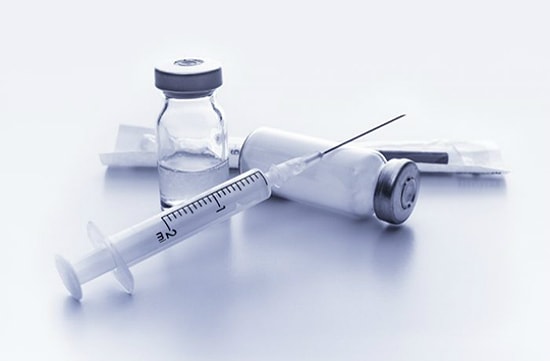
Up to four years of age, a vaccination with the Russian DPT vaccine can be delivered. When the necessary series of vaccinations is not completed by this age, then from 4 to 6 courses are completed with ADS vaccine, or ADS-M - after the onset of six years.
If children have average or serious illnesses, recently had a fever, the vaccination is postponed until the health is fully recovered. There is no reason to postpone a cold shot and mild respiratory problems. Sometimes parents ask themselves - if due to a temporary illness they missed next term DTP, what to do in this case. The interval between vaccinations can be done even more than it should be according to the schedule, since immunity from the introduction of the previous vaccine is preserved, and the next injection is given upon recovery.
Vaccinations in adults

DTP vaccination for adults is given every 10 years after the end of the children's series of vaccinations. An adult's body must receive Td amplifiers. Adults in contact with children under one year old are given a one-time vaccine with a Td booster.
Those who were not vaccinated in childhood should:
- contact the clinic for a series of vaccinations;
- pregnant women - to be vaccinated after twenty weeks of pregnancy;
- everyone who gets a bruise laceration should get a tetanus shot.
After being wounded:
- the vaccine must be given if the last vaccine was administered five years before the event and earlier;
- up to 7 years, when the series of vaccinations is not completed;
- people who have not completed the primary series of tetanus vaccinations.
How to prepare for vaccination
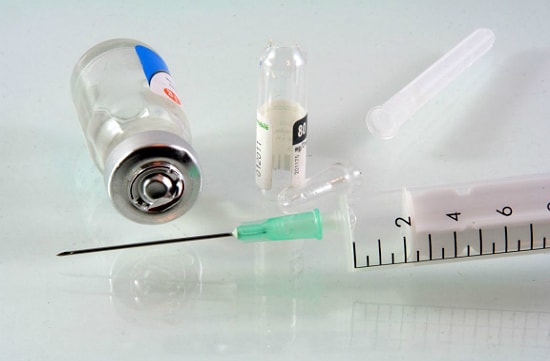
Side effects are possible when the vaccine is given because the drug contains antigens. A drug preparation is recommended for children. Antipyretic drugs should be taken before vaccination so that the baby does not have temperature cramps after the procedure. Moreover, antipyretics have anti-inflammatory and analgesic effects - the injection will not hurt, and there will be no edema in its place.
Picking up antipyretic drug, you need to know the following things:
- the form of release of the drug must be age appropriate;
- it is better to take a rectal suppository, since antipyretic syrups contain flavors, and they are an additional allergen that is undesirable before vaccination;
- antipyretic should be given to the child before vaccination, in advance, without waiting for the temperature to rise as a reaction to the injection;
- you cannot give aspirin, you can - paracetamol and ibuprofen;
- if the first vaccination did not cause complications, one should not neglect the preparation for vaccination, usually the second and subsequent vaccinations give a reaction;
- if after the injection something went wrong, you need to call the doctor on duty emergency care, consult with him, if necessary, call an ambulance at home.
Preparation for the procedure and actions after it

If the child is prone to diathesis and allergies, a couple of days before the procedure, he needs to be given anti-allergic drugs in a prophylactic dose, especially if the procedure is carried out in summer period since in the given time years more factors contributing to the manifestation of allergies.
Immediately after the procedure, an antipyretic suppository should be introduced, also - put it overnight, measure the temperature within 24 hours after the injection, together with the antipyretic, continue to give an anti-allergy agent.
The next day after the procedure, continue to give both drugs 3 times.
On the second day - give an antipyretic only if the temperature is maintained, continue to give an antihistamine.
On the third day, the temperature should no longer rise. If it is, the reason is different, perhaps - from a cold, or it is teething.
Side effects of vaccination
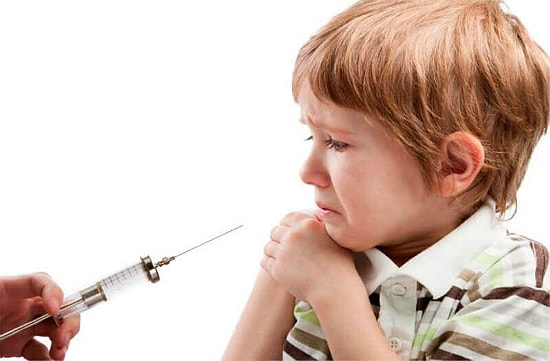
Parents always wonder how the vaccine is tolerated.
The drug can cause allergies. Before vaccination, parents need to warn the doctor that the child is prone to allergies. Now two types of DPT are used, the new generation variant causes allergies more often. A common reaction after an injection is a rash on the skin, you do not need to be afraid of the rash, this is an immune reaction, not an allergy. It should be noted that this is a vaccination, which in the entire history of use did not entail a single case of death, even among allergy-prone children. Therefore, it is worth putting it on a child.
The injection site may hurt, swelling may appear on it, and the seal may last for several days. If there is such a reaction, you can do cool lotions with herbs at the injection site. The child should wear soft, loose clothing that will not chafe the injection site.
After vaccination, a slight fever, lack of appetite are possible, the child may be capricious, he may be sleepy.
To reduce the possible negative action to a minimum, parents should ask the doctor to give all four injections with the same brand of substance as the first time.
Reasons to be alert after an injection
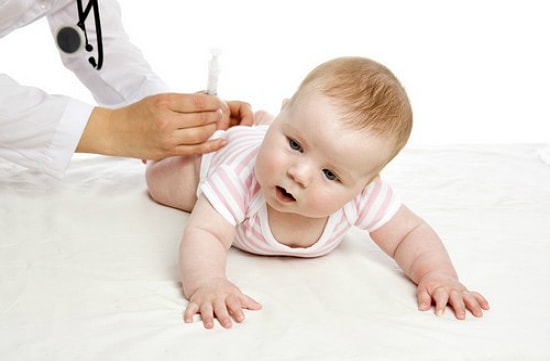
If the child's temperature rises above 39 ° C, you should immediately consult a doctor. The new generation vaccine less often leads to such a side effect, there is a high likelihood of a rise in temperature after the first vaccination, subsequent vaccinations can do without temperature.
Fever should be alerted one day after vaccination, since this may not be associated with vaccination. In this case, you also need to call a doctor.
In children under two years of age, it may decrease blood pressure- this usually happens two days after vaccination. First, a febrile state sets in, the child becomes irritated and capricious, and then becomes apathetic, weak. Skin integument may turn pale to blue. This reaction should not last longer than 6 hours.
It is bad when, after vaccination, neurological effects appear. This is the impact of the whooping cough component. It is also necessary to inform the doctor about this. The symptom is distracted attention. But this effect rarely happens, and only in children prone to neurological disorders... Comes in 3-3 days after vaccination.
The debate about whether vaccinations are really necessary has been going on all over the world for a long time. For example, in the UK, after vaccination statistics were published in 1970, there has been big number failure to vaccinate.
Contraindications to vaccination

There are temporary and absolute contraindications to vaccination. Temporary infections include acute infectious diseases, exacerbations of chronic diseases, and stress.
Any acute infectious diseases- from rotavirus infection before sepsis. After the onset of recovery, the issue of vaccination is resolved individually with the attending physician, who, when making a decision, will take into account the duration and severity of the illness. If there was slight cold, then the vaccination can be done already a week after recovery, and if, for example, there was pneumonia, then it should not pass before the vaccination less than a month... It is not recommended to be vaccinated even when there are infectious patients where the child lives.
Exacerbations of chronic diseases- in this case, they are vaccinated one month after the disease enters the remission stage. A month is needed to make sure that the child has really passed the stage of exacerbation of the disease. On the day of the vaccination, the doctor will examine the child, measure the temperature, and only after that the vaccination will be carried out. If the attending physician still has doubts, he will additionally prescribe blood and urine tests, and, if necessary, send for examination to narrow specialists.
Stress in adults, when it comes to vaccination for an adult, is also a contraindication to vaccination, because the body's immune system is weakened against the background of stress. It can be sad events in the family - the death of someone close to you, moving, divorce, scandals at home or serious problems at work. The stress contraindication is not medical, but it can adversely affect vaccination results.
Absolute contraindications- this is an individual intolerance to the vaccine, a strong reaction to a previous vaccination - regardless of whether it is the first or repeated, diseases of the central nervous system, problems with immunity or lack thereof, and, directly, the three diseases themselves, for the prevention of which they are vaccinated - whooping cough, tetanus and diphtheria.
If a child is allergic to at least one of the components included in DTP composition, then vaccination is completely contraindicated for him, since it can lead to anaphylactic shock and cause Quincke's edema.
In case the reaction child's body on the previous vaccination was strong - the temperature rose to 39.5 ° -40 ° C, or there were convulsions, then the series of vaccinations is stopped altogether.
Contraindications are progressive diseases of the central nervous system. You can not vaccinate children who have had afebrile seizures.
Low immunity or lack of it (both congenital and acquired) - absolute contraindication to vaccination, since the composition of the drug forces the body to fight the virus, independently producing antibodies, and in case of violations immune system he will not be able to do this.
Previous whooping cough, tetanus and diphtheria make changes to the schedule and composition of vaccinations. If a child has had whooping cough, then DPT is no longer prescribed to him, but only ADS or ADS-m is taken (the letter “m” in the abbreviation means “in small doses”). If the child has had diphtheria, then the series of vaccinations begins with the last dose prescribed on the schedule. After suffering tetanus, the whole series of vaccinations is restarted.
DTP vaccination - what is it? This question worries moms and dads. All parents are worried when such young children are given preventive vaccinations... Before vaccination, do not hesitate to ask the doctor in detail what a DPT vaccination is, scatter it for consultations in medical institution your doubts and, if there are no contraindications to vaccination, be sure to vaccinate the child.
The DPT vaccine is today considered the most controversial and very dangerous procedure, causing a flurry of discussions about its feasibility. This term denotes a drug of complex action - adsorbed pertussis-diphtheria-tetanus vaccine, which begins to be administered to a child with three months of age in several stages.
What will the complex vaccination protect against?
In developed countries, injection is compulsory for all children, as it becomes a reliable barrier against three deadly dangerous diseases, proceeding in a severe form. The peculiarity of the course of tetanus, as well as diphtheria, is provoked not by microbes, but by their toxins, against which the vaccine is able to form a reliable immunity.
The combined drug, administered according to a certain scheme throughout life, protects a person from dangerous infections, which are especially difficult to tolerate during early childhood.
- Whooping cough. Infection with an acute infection occurs from long-term coughing adults or from schoolchildren with an atypically developing ailment (without fever and paroxysmal cough). Characteristic feature whooping cough - symptoms of a paroxysmal cough. Infection occurs during coughing; pertussis bacillus is present in the sputum particles, which is the causative agent of the disease. Vaccination allows you to form a more stable immune memory than after the disease.
- Diphtheria. The danger of an illness in a severe form of its course with a possible fatal outcome. Infection with Leffler's bacillus (the causative agent of diphtheria) occurs mainly through carriers of the infection, to a lesser extent through sick people. The phenomenon of the carrier of bacteria is a feature of diphtheria, when a person with immunity against the disease does not get sick, but is able to infect others. In this case, the vaccine becomes an obstacle to the disease, producing antibodies to fight the toxin, and not the microorganism.
- Tetanus. The disease is not only particularly severe, but also fatal in 90% of cases. The infection is caused by a special tetanus bacillus, which enters the body through any skin damage during trauma or injury. Dust and soil are considered the characteristic habitat of the microbe, people do not become a source of infection. Just as with diphtheria, with tetanus, the toxin produced by the bacillus threatens the danger, which results in damage to the nervous system. There is still no cure for tetanus, so after any injury, tetanus toxoid or tetanus toxoid vaccination is necessary.

Important: similar principles of diphtheria and tetanus infection have made it possible to create a common vaccine against these diseases. It includes neutralized toxins, the introduction of which stimulates the formation of anti-toxic immunity. In this case, the formation of an antimicrobial response to infection does not occur, as well as lifelong. Therefore, revaccination is necessary.
To prevent all three infections, a complex DPT vaccine has been created; it is administered using the following drugs:
- vaccines Russian production, whole cell;
- with Infarix - the vaccine is acellular, contains fragments of proteins of the microbe that causes whooping cough, as well as diphtheria-tetanus toxoid;
- the drug Tetrakok - a whole-cell vaccine with killed cells of the pertussis bacillus, diphtheria-tetanus toxoid with the addition of cells of the non-living pathogen of poliomyelitis;
- Pentaxim is a combined vaccine, acellular, in addition to poliomyelitis, it contains protection against hemophilic infection.
The Russian vaccine is state-owned and supplied free of charge; three other drugs are imported, therefore they are a commercial alternative. The most favorable consequences may be after the use of a cell-free preparation.
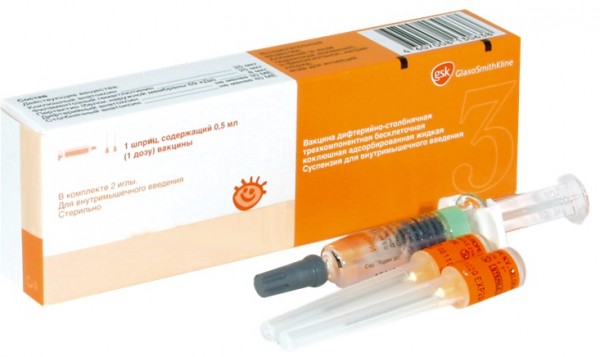
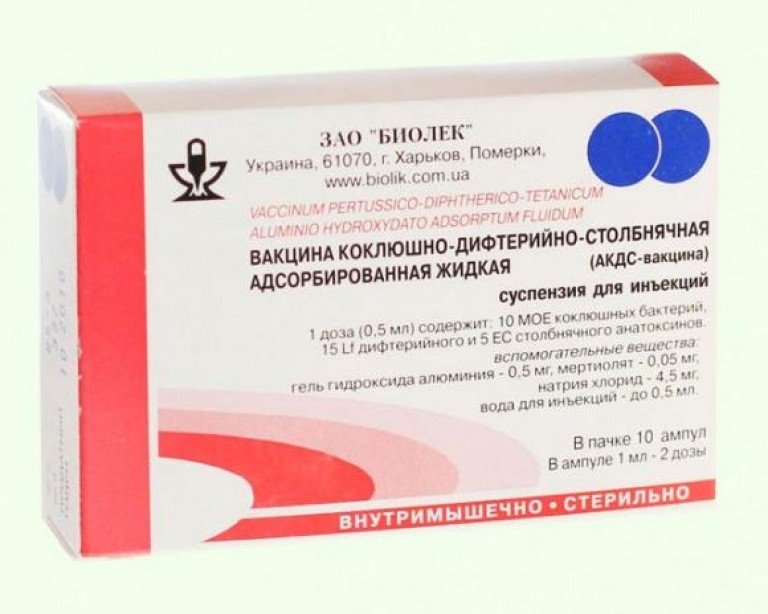
Advice: parents should not resent the early vaccination of children against such formidable diseases. Doctors consider such a test of immunity to be justified, since whooping cough is especially dangerous for infants, and vaccination contributes to the faster appearance of reliable protection in the child.
What is the schedule for DTP immunization?
The reason that the vaccine is administered from the age of three months is in the destruction after 60 days of maternal antibodies received from the mother after the birth of the child.
Important: after revaccination against whooping cough, they no longer vaccinate; diphtheria and tetanus are resisted by injection at the age of 7 and 14 years. After that, adults are recommended to be vaccinated every ten years, in case of injuries, it is mandatory. The interval between vaccinations must be at least a month.
What actions are required to prepare a child for DPT
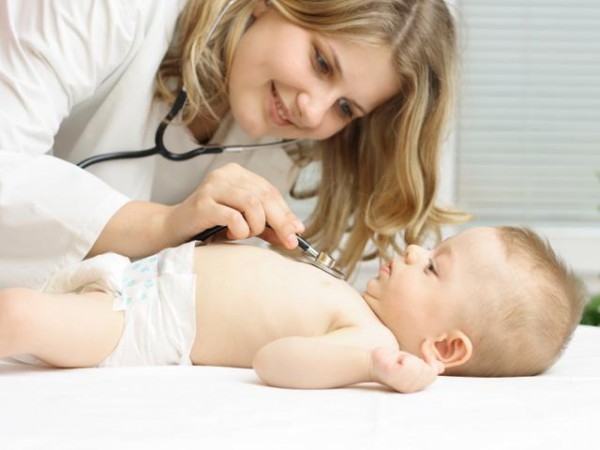
- Visit a pediatrician who will prescribe tests and diagnostic methods, it is also advisable to visit an immunologist, he will take care of choosing the most suitable drug for the baby for immunization.
- On the eve of the vaccination (three days in advance), as well as three days after the procedure, the child should be given an antihistamine to prevent allergies. The choice between suprastin or Fenistil drops should be made by the doctor and suggest the dosage.
- Serum injection is combined with the appointment of antipyretic and analgesic drugs, which should be purchased in advance, and the temperature should be constantly monitored. The medications used do not interfere with the development of immunity.
Important: currently DTP vaccination is given intramuscularly. The injection into the buttock has now been abandoned, because when it gets into the fatty layer, the substance causes the formation of a long-absorbing seal, which prevents the effectiveness of the procedure.
Features of using the DPT vaccine
Although the government vaccine infects the body with bacteria and causes symptoms of tetanus and diphtheria, it does not threaten the health of the person being vaccinated. The reason is that it is not the bacteria themselves that threaten the danger, but the products of their vital activity. In the composition of tetanus and diphtheria toxoid, the poisonous substance of the body is rendered harmless. chemically, as a result of which intoxication is excluded, and protective antibodies are formed in the blood.
The third component of the drug is a set of inactivated whooping cough sticks. However, their composition contains a small proportion of toxic elements that can cause a number of unwanted side effects. This property of the drug has led to the fact that children after seven years of age are vaccinated with acellular (acellular) pertussis vaccine, which is much easier to tolerate, but the effectiveness of the process suffers from this.
Advice: if routine vaccination for some reason I had to skip, then the vaccination is not repeated, but continues further, especially since other vaccinations can be combined with an injection of DPT. Children who have not been vaccinated before the age of 7 are shown only ADS vaccine twice with a month's break, and adults - one injection.
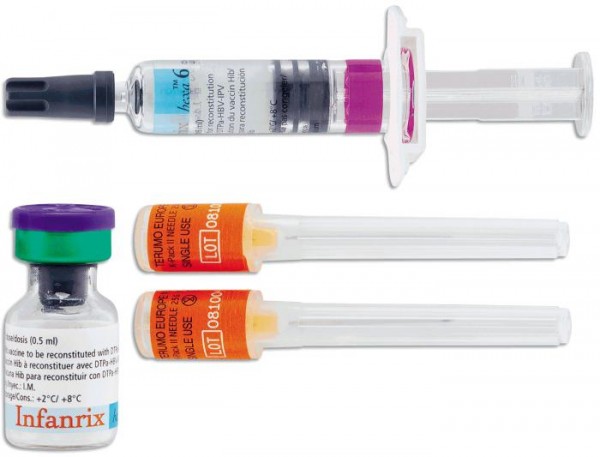
What are the consequences of combination vaccination
The development of post-vaccination reactions (side effects) to drug administration occurs in 30% of vaccinated children. Moreover, most often reactions occur to the third and fourth vaccinations. They should not be confused with complications that are pathology, but side effects usually do not last long and disappear without leaving a trace of health problems.
DTP vaccination is considered a rather difficult procedure, the reaction to it is systemic, and sometimes the injection is especially difficult to tolerate. All side effects are reversible, so these are not complications at all and they do not harm the baby's health. This is just the response of the organism being vaccinated to the introduction of foreign cells.
What reaction can a complex vaccination give:
- at the injection site, a characteristic trace with compaction and redness remains;
- because of a feeling of soreness, walking may be disturbed, touching the injection site causes crying;
- against the background of general anxiety and tearfulness, the temperature sometimes rises slightly;
- the child becomes lethargic and sleepy;
- a disorder of the digestive system is manifested by diarrhea and vomiting, appetite is disturbed.
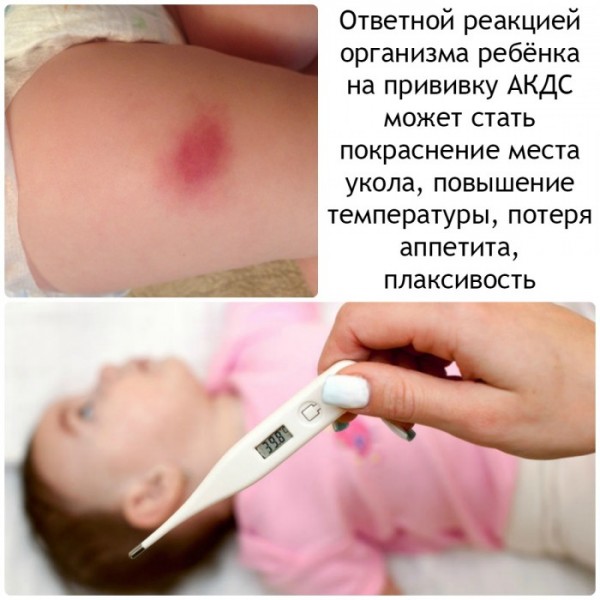
Advice: it should be remembered that such reactions appear on the first or second day after the administration of the vaccination drug. If the listed signs are observed two to three days after the injection, then they are not a reaction to vaccination, but may be symptoms of a concurrent infection. In this case, a visit to the doctor is required.
Unfortunately, the reaction to the vaccine can be severe - accompanied by prolonged and persistent crying against a background of significant temperature (above 39 degrees), and the swelling at the injection site can increase significantly (up to 8 cm or more). There will also be no harm to health from such symptoms, they are reversible, but it is necessary to inform the doctor. The drugs prescribed by your doctor before DPT vaccination will help relieve the severity of side effects.
In addition to systemic and severe reactions, vaccination can give complications leading to dangerous health problems:
- complicated forms of allergies, up to Quincke's edema and anaphylactic shock;
- the appearance of seizures normal temperature body;
- the development of encephalitis;
- the appearance of neurological symptoms of encephalopathy, up to shock.
Such complications are usually extremely rare, the reason for their appearance in the pertussis component of the vaccine, which has a strong irritating effect on the meninges. In the presence of convulsive and neurological symptoms, further vaccination is contraindicated.
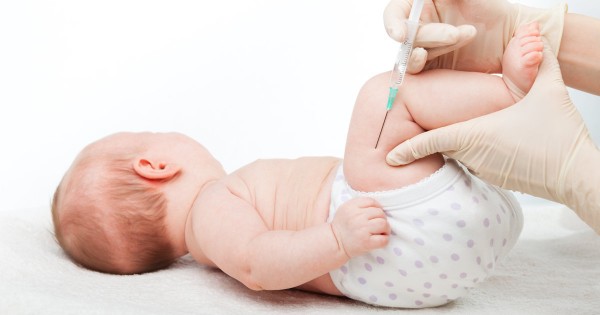
Advice: so that the DPT vaccination does not turn out to be unpleasant and dangerous consequences, do it only absolutely healthy child, follow the rules of preparation for manipulation, and after it do not be lazy to carefully observe the behavior of the baby and his condition. Then, despite the high rectogenicity of a properly selected drug, protection from diseases that threaten the baby's health will be provided.
Whether to vaccinate a child with akds or is it worth saying no
